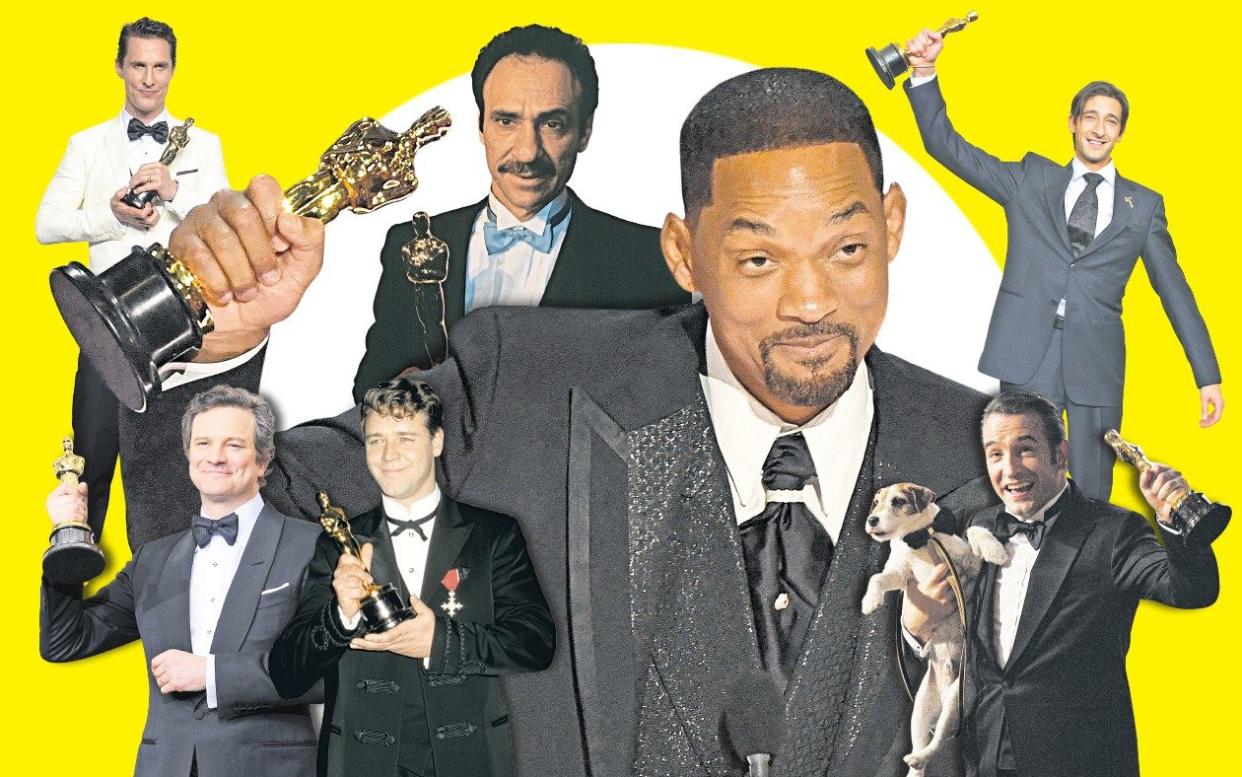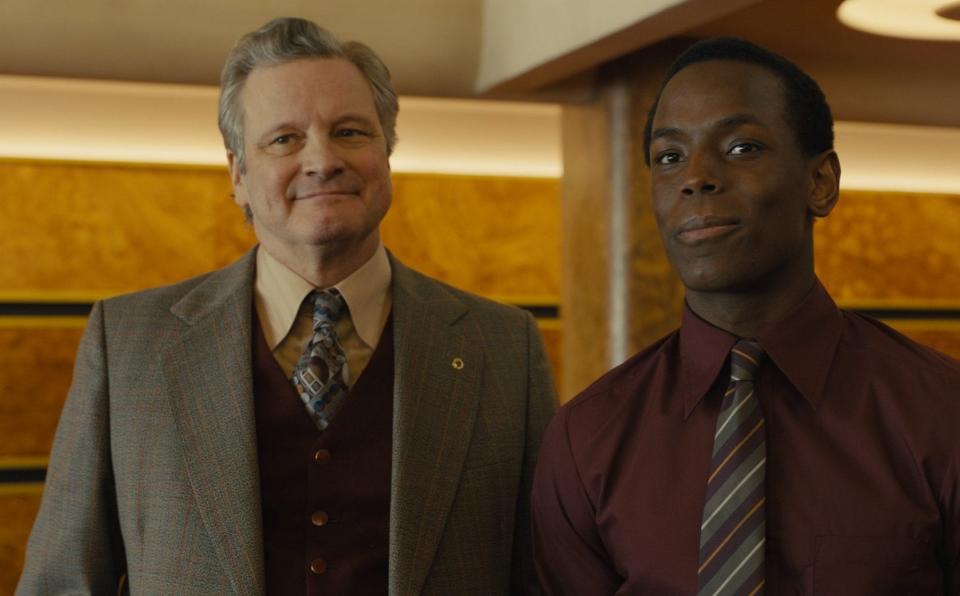Will Smith and the curse of the Best Actor Oscar

The Oscars ceremony, once the self-congratulatory highpoint of the film industry’s calendar, is rapidly turning into an annual instalment of Curb Your Enthusiasm – albeit with rather more physical violence than the Larry David sitcom. Last year’s spectacle of Will Smith striding onto the stage to slap Chris Rock for insulting his wife, before making a tearful God-thanking speech as he accepted the Best Actor award a few moments later, was easily one of the most awkward scenes ever shown on television – one that, as many have suggested, should have ended with Smith led away in handcuffs after being arrested for committing assault.
The 2023 nominees for Best Actor – all first-timers – will have learnt their lesson from Smith, who is now banned from the ceremony for a decade and will inevitably be the butt of host Jimmy Kimmel’s jokes in his opening monologue. It is hard to imagine Living’s Bill Nighy striding elegantly up on stage to chastise a presenter for mocking the actor’s patented drawling delivery, for instance, or Austin Butler angrily leaping up and launching into a karate kick if some jibe is made about the fact that he cannot stop talking like Elvis, the man he has been Oscar-nominated for impersonating.
All five have a reputation for charm and likeability, whether it’s the 27-year-old Paul Mescal, his fellow Irishman Colin Farrell or Brendan Fraser cementing a remarkable comeback from the wilderness with his performance in Darren Aronofsky’s The Whale. Any of them deserve the award. Yet whoever wins on March 12 might be forgiven for holding up the Oscar and wondering whether they’re embracing a poisoned chalice, rather than the highest accolade of their peers.
It was once said (lazily, and with a touch of misogyny) that the Oscar most likely to lead to a career downturn was that of Best Supporting Actress, as it placed its recipient in that dangerous area – that of a character actor rather than a star – and thereby condemned them to lower-profile work. The estimable likes of Brenda Fricker, Mercedes Ruehl and Mira Sorvino were thus denigrated. Yet this has been spectacularly disproven in recent years, with everyone from Cate Blanchett to Viola Davis finding that the Oscar has given their careers a great and well-deserved boost.
Instead, it is the Best Actor award that increasingly seems to blight one’s professional opportunities. You could even say the trophy comes with a curse.
Since the turn of the millennium, when Russell Crowe was a popular winner for his ferocious performance in Gladiator, the award has gone to an eclectic variety of actors. Sean Penn and Daniel Day-Lewis have both won twice, and everyone from Anthony Hopkins and Colin Firth to Jeff Bridges and Jean Dujardin has been recognised by the Academy.
Some undeniably great performances have been honoured – one thinks of Adrien Brody in The Pianist, or Penn in Milk – as well as some more head-scratching accolades. The less said about Rami Malek’s teeth-driven impersonation of Freddie Mercury in the bewilderingly successful Bohemian Rhapsody, the better.
Yet, deserved or not, there seems an increasing correlation between the Best Actor award and a subsequent decline in its recipient’s career. Brody won his gong in 2002, and was rewarded with a plum role in Peter Jackson’s iffy remake of King Kong, yet his most memorable recent role was an extended cameo in Succession. Dujardin, who famously received an Oscar for his virtually silent role in The Artist, is currently appearing in Nespresso adverts with George Clooney. Colin Firth, recipient of the accolade for his performance as George VI in The King’s Speech, has found himself largely mired in undistinguished supporting appearances in such films as Sam Mendes’ recent Empire of Light.

These men should be enjoying roles of remarkable distinction and power. Instead, if they’re Russell Crowe, they are appearing in the horror potboiler The Pope’s Exorcist.
Virtually every actor who has won a Best Actor award in the past two decades has seen a sharp downturn in the parts they accept. Matthew McConaughey may have cemented the so-called ‘McConaissance’ with his Oscar for Dallas Buyers Club, but nearly a decade later, his biggest hits have been his vocal roles in the Sing pictures. (The less said about his Best Supporting Actor co-star Jared Leto and his utterly perplexing subsequent choices, the better.) Casey Affleck triumphed for his performance in Manchester by the Sea, but the award seemed to condemn him to a ghetto of similar indie pictures, none of which have made any kind of dent on the public consciousness.
And even Gary Oldman, currently triumphing in the Mick Herron TV adaptation Slow Horses, found himself making undistinguished flotsam like Joe Wright’s The Woman in the Window in the wake of his award for playing Winston Churchill under heavy prosthetics in Darkest Hour.
At least these actors are all still working. In the case of American Beauty Oscar-winner Kevin Spacey, they could be awaiting trial for sexual assault, or, if they were Philip Seymour Hoffman, who was lauded for his uncanny performance as Truman Capote in 2005, they could have died of a drug overdose at the age of 46.
Anthony Hopkins, who deservedly won the Oscar in 2020 for his powerful appearance in The Father, was unlucky enough to be trolled by outraged fans of the late Chadwick Boseman, who believed that the Black Panther star was more deserving for his final appearance in Ma Rainey’s Black Bottom. Boseman’s award seemed so nailed-on that Hopkins was not even present for the ceremony, leading to an anti-climactic moment when the embarrassed host Joaquin Phoenix had to announce that the Academy accepted the award on the absent winner’s behalf.
Even in the instances of successful actors who won the Oscar and continued their careers in the same high-profile fashion as before – the Leonardo DiCaprios and Eddie Redmaynes of this world – there are the same sundry embarrassments that any famous actor is exposed to, whether it’s DiCaprio’s being questioned by the FBI about his involvement with the fugitive Malaysian financier Jho Low or Redmayne’s continued embarrassment at being questioned about his views on J.K. Rowling whenever the topic of his Fantastic Beasts series is raised.
These issues are unrelated to their being Oscar-winning actors, but there is no doubt that the award gives any recipient a higher profile for a while, and with it the inevitable scrutiny that a lower-profile performer might have hoped to evade. Jude Law, Oscar-nominated for Cold Mountain but no winner, has not been grilled about his opinion on Rowling’s statements with the same fervour that his Beasts co-star Redmayne has.

Of course, there are undeniable advantages to winning an Oscar, too. It connotes fame and fortune, and allows its recipient to take their pick of the best roles – if only, for a brief window. And sometimes there can be a second act. F Murray Abraham won in 1984 for his performance as the jealous Salieri in Amadeus, only to see his career stutter amidst rumours that he was all but impossible to work with. By his own admission: “I became arrogant, I became too demanding, I became too full of myself.”
He's since found a new and highly successful life as a character actor, appearing in the most recent series of The White Lotus and Homeland, and has no regrets over his award. “The Oscar is the single most important event of my career,” Murray has said. “I have dined with kings, shared equal billing with my idols, [and] lectured at Harvard and Columbia. If this is a jinx, I'll take two.”
Whoever wins this year, they might gaze upon Hollywood’s last true movie star, Tom Cruise, who is Oscar-nominated this year for producing Top Gun but not for starring in it, and wonder whether his lack of an Academy Award for Best Actor has held back his career. In his case, all that glitters is certainly not golden.


